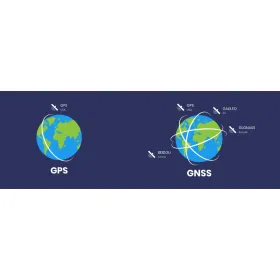Difference Between GPS Tracking and GPS Navigation
Understanding the Difference Between Tracking and Navigation GPS
What’s the Difference Between GPS Tracking and Navigation?
In today’s fast-paced world, GPS (Global Positioning System) technology plays a vital role in both personal and business activities. From finding your way to an unfamiliar destination to monitoring the real-time location of a delivery vehicle, GPS is everywhere.
While GPS tracking and GPS navigation both rely on the same satellite-based system, they serve very different purposes. At Zard, we help you understand these differences clearly so you can choose the right solution for your needs.
How GPS Technology Works
GPS operates through a network of satellites orbiting the Earth. Devices equipped with GPS receivers communicate with multiple satellites to calculate their exact position using a process called trilateration.
Once the location is determined, the data can be used in two primary ways: for navigation or for tracking. Although the underlying technology is the same, the information flow, usage, and objectives differ between the two.
Key Differences Between GPS Tracking and GPS Navigation
Zard breaks down the main differences between GPS tracking and GPS navigation below:
-
Flow of Information
-
Navigation: Provides live location updates and turn-by-turn instructions to the user.
-
Tracking: Captures the entity’s location and sends it to a third party (such as a fleet manager) for remote monitoring.
-
-
Purpose
-
Navigation: Helps users reach a destination by providing routing guidance.
-
Tracking: Focuses on monitoring the real-time location and movement of vehicles, assets, or individuals.
-
-
Usage Examples
-
Navigation: Assists drivers, pilots, or sailors in reaching a target destination efficiently.
-
Tracking: Enables businesses to monitor delivery vehicles, track stolen assets, or oversee personnel movement.
-
What Is GPS Navigation?
GPS navigation is designed to assist a user in traveling from one point to another. It:
-
Calculates the best route to a destination.
-
Provides step-by-step directions.
-
Updates in real time based on traffic conditions or route changes.
-
Commonly used in cars, smartphones, airplanes, and ships.
Navigation systems are focused solely on helping the user find the best path and stay on course until the destination is reached.
What Is GPS Tracking?
GPS tracking is used to remotely monitor the location and movements of an object, vehicle, or person. It:
-
Continuously records and sends location data to a central system (like Zard’s tracking platform).
-
Allows real-time visibility and historical route playback.
-
Sends alerts for specific behaviors (speeding, unauthorized movement, etc.).
-
Helps in asset protection, fleet management, and personal safety.
Tracking focuses on oversight and reporting rather than user navigation.
Real-World Examples
GPS Navigation Example:
A delivery driver uses a GPS navigation system to find the quickest route to a customer's address.
GPS Tracking Example:
A fleet manager at a logistics company uses GPS tracking to monitor all vehicles' real-time locations and ensure on-time deliveries.
Why Understanding the Difference Matters
Choosing between GPS navigation and GPS tracking depends on your goals:
-
Need to reach destinations efficiently? → You need navigation.
-
Need to monitor, manage, and secure vehicles, assets, or people? → You need tracking.
At Zard, we specialize in providing advanced GPS tracking solutions tailored for businesses, fleets, and individual needs across Saudi Arabia.
Frequently Asked Questions
-
Can a GPS device do both tracking and navigation?
Some devices combine both features, but specialized solutions offer better performance depending on your primary need. -
Is GPS tracking legal in Saudi Arabia?
Yes, and Zard is fully licensed by the Communications, Space & Technology Commission (CST) to provide GPS tracking services. -
Does GPS navigation store data like GPS tracking does?
Navigation systems usually do not store long-term location data; tracking systems are built specifically to log and report detailed movements.
Related Articles from Zard Blog
Final Thoughts
Understanding the difference between GPS tracking and GPS navigation is essential for making the right technology investment. Whether you’re guiding drivers to their destinations or overseeing a fleet’s performance, Zard has the smart tracking solutions you need.
Start Smarter Tracking with Zard
Need a powerful GPS tracking system customized for your business or personal use? Zard offers cutting-edge tracking devices, secure platforms, and expert support across Saudi Arabia.
Browse GPS Tracking Solutions
Contact Us for a Free Consultation
No posts found
Write a review
